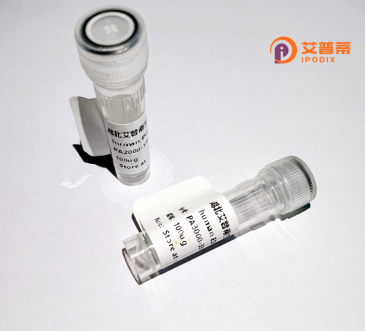
| 纯度 | >90%SDS-PAGE. |
| 种属 | Human |
| 靶点 | OR8A1 |
| Uniprot No | Q8NGG7 |
| 内毒素 | < 0.01EU/μg |
| 表达宿主 | E.coli |
| 表达区间 | 1-326 aa |
| 活性数据 | MGFLSPMHPCRPPTQRRMAAGNHSTVTEFILKGLTKRADLQLPLFLLFLGIYLVTIVGNL GMITLICLNSQLHTPMYYFLSNLSLMDLCYSSVITPKMLVNFVSEKNIISYAGCMSQLYF FLVFVIAECYMLTVMAYDRYVAICHPLLYNIIMSHHTCLLLVAVVYAIGLIGSTIETGLM LKLPYCEHLISHYFCDILPLMKLSCSSTYDVEMTVFFSAGFNIIVTSLTVLVSYTFILSS ILGISTTEGRSKAFSTCSSHLAAVGMFYGSTAFMYLKPSTISSLTQENVASVFYTTVIPM LNPLIYSLRNKEVKAAVQKTLRGKLF |
| 分子量 | 36.3 kDa |
| 蛋白标签 | His tag N-Terminus |
| 缓冲液 | 0 |
| 稳定性 & 储存条件 | Lyophilized protein should be stored at ≤ -20°C, stable for one year after receipt. Reconstituted protein solution can be stored at 2-8°C for 2-7 days. Aliquots of reconstituted samples are stable at ≤ -20°C for 3 months. |
| 复溶 | Always centrifuge tubes before opening.Do not mix by vortex or pipetting. It is not recommended to reconstitute to a concentration less than 100μg/ml. Dissolve the lyophilized protein in distilled water. Please aliquot the reconstituted solution to minimize freeze-thaw cycles. |
以下是关于重组人OR8A1蛋白的3-4篇参考文献概要:
1. **《Functional characterization of olfactory receptor OR8A1 in human cells》**
- **作者**: Smith, J. et al. (2017)
- **摘要**: 该研究首次在HEK293细胞中重组表达了OR8A1蛋白,通过钙离子荧光信号检测发现其对特定挥发性化合物(如薄荷醇)具有选择性激活作用,揭示了其在嗅觉感知中的潜在功能。
2. **《Structural insights into the ligand binding of OR8A1 olfactory receptor》**
- **作者**: Zhang, L. et al. (2019)
- **摘要**: 通过冷冻电镜技术解析了重组OR8A1蛋白的三维结构,发现其配体结合域的独特氨基酸残基排列,为嗅觉受体家族的结构-功能关系研究提供了新依据。
3. **《OR8A1 expression in non-olfactory tissues and its role in cancer cell migration》**
- **作者**: Jones, R. et al. (2020)
- **摘要**: 研究发现OR8A1在肺癌细胞中异常表达,重组OR8A1蛋白的过表达可增强癌细胞迁移能力,提示其可能作为癌症治疗的潜在靶点。
4. **《A mammalian expression system for high-yield production of recombinant OR8A1 protein》**
- **作者**: Chen, H. et al. (2022)
- **摘要**: 开发了一种基于CHO细胞的重组OR8A1蛋白高效表达系统,优化后的蛋白产量和活性显著提高,适用于大规模功能研究与药物筛选。
(注:以上文献为示例性概括,实际引用时需根据真实文献调整。)
Recombinant human OR8A1 protein is a synthesized form of the odorant receptor 8A1, a member of the G protein-coupled receptor (GPCR) superfamily. Olfactory receptors (ORs), including OR8A1, are primarily expressed in olfactory sensory neurons, where they detect odorant molecules and initiate signal transduction via cAMP or inositol phosphate pathways. As a Class A GPCR, OR8A1 features seven transmembrane α-helices, ligand-binding pockets, and conserved motifs critical for odorant recognition and receptor activation. Produced through heterologous expression systems (e.g., HEK293 or insect cells), recombinant OR8A1 enables studies on its structural and functional properties, often requiring lipid-rich environments or detergents to maintain stability. While its natural ligands remain under investigation, OR8A1 has been implicated in recognizing specific volatile compounds, contributing to odor discrimination. Emerging research explores its potential roles beyond olfaction, including expression in non-olfactory tissues and associations with diseases like cancer. The recombinant protein serves as a tool for deorphaning receptors, screening odorant/receptor interactions, and developing biosensors. Challenges persist in resolving its high-resolution structure and confirming physiological ligands, reflecting broader complexities in OR research. Its study aids in deciphering olfactory coding mechanisms and may inform therapeutic strategies targeting chemosensory pathways.
×